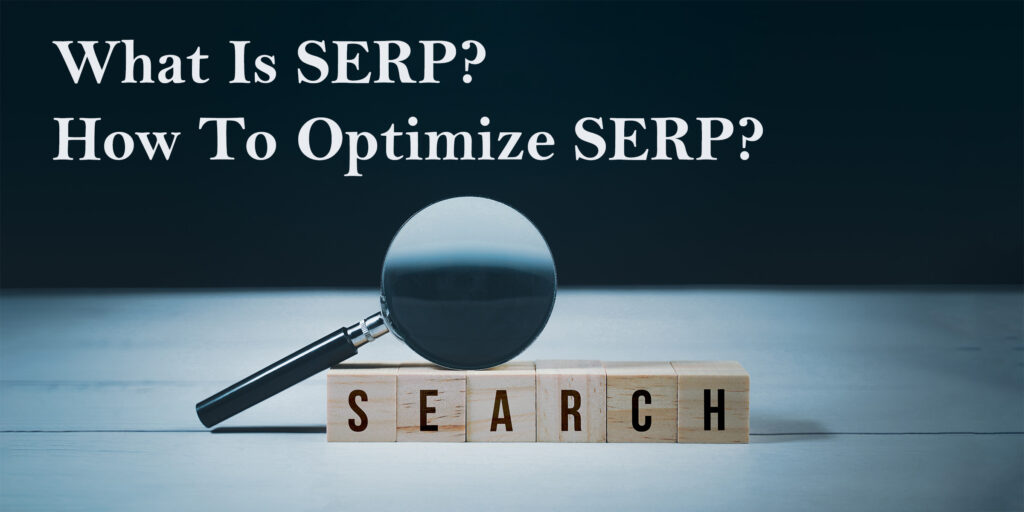In the vast and ever-evolving digital landscape, where billions of searches are conducted each day, appearing on the first page of a search engine’s results is the ultimate goal for website owners and marketers. But have you ever wondered what happens before users even click on a website link? This is where SERP, or Search Engine Results Page, plays a crucial role. In this article, we’ll delve into what SERP is and why it’s vital for online visibility. Furthermore, we’ll explore various strategies to optimize your SERP presence to increase click-through rates (CTR), ultimately boosting your website’s performance in the competitive online world.
1. What is SERP?
SERP, or Search Engine Results Page, is the initial interface that users encounter when they perform a search on a search engine like Google, Bing, or Yahoo. It’s the digital marketplace where websites vie for the attention of searchers. The SERP is a dynamic and multifaceted display of information, carefully curated by search engines to provide users with relevant and useful content.
Key Components of SERP:
Organic Search Results: These are the unpaid listings of web pages that match the user’s query based on search engine algorithms. They are ranked by relevance, and the most relevant results typically appear at the top.
Paid Advertisements: Often displayed at the top or side of the SERP, these are sponsored links that advertisers pay for to promote their products or services.
Featured Snippets: These are concise summaries or answers extracted from web pages, displayed at the top of the SERP to provide quick answers to user queries.
Knowledge Graph: A sidebar that provides information about entities, such as famous personalities, landmarks, or historical events, often appearing for specific queries.
Images and Videos: SERPs can include visual elements, such as images and video thumbnails, to enhance the user experience and provide more diverse search results.
2. The Importance of SERP
Understanding the significance of SERP is crucial for anyone involved in online marketing, web development, or search engine optimization (SEO). Here are some key reasons why SERP matters:
First Impressions: SERP is the first impression your website makes on users. It’s the gateway that determines whether a user clicks through to your website or moves on to another result. Therefore, a well-optimized SERP can be the difference between a potential customer visiting your site or bouncing away.
Visibility and Click-Through Rates (CTR): Not all impressions on the SERP will be converted into clicks. High visibility on the SERP increases the likelihood of users clicking on your link. Therefore, optimizing your SERP presence can lead to higher CTR, driving more organic traffic to your website.
Trust and Authority: Appearing on the first page of search results implies trust and authority in the eyes of users. People tend to trust search engine rankings, and being on the first page can enhance your website’s credibility.
Competitive Advantage: In a highly competitive online landscape, optimizing your SERP presence can give you an edge over competitors. It allows you to stand out and grab users’ attention in a crowded marketplace.
3. How to Optimize Your SERP
Now that we’ve established the importance of SERP, let’s explore several strategies to optimize your SERP presence and increase click-through rates.
3.1 Add Stunning Images
Visual content can make a significant impact on the SERP. Incorporating high-quality and relevant images into your search listings can attract users’ attention. For products, consider using images that showcase the product’s features and benefits. For blog posts or articles, use images that convey the essence of the content.
Additionally, make sure to optimize your images by using descriptive file names and alt text. This not only improves accessibility but also provides search engines with more context about the content of the image.
3.2 Concise and Clear Title to Drive Attention
The title tag of your web page is one of the most critical elements of your SERP listing. It serves as a concise summary of your page’s content and should be attention-grabbing and relevant to the user’s query. Here are some tips for optimizing your title tags:
- Include your target keyword: Incorporate the primary keyword that users are likely to search for when looking for your content or product.
- Keep it concise: Aim for a title that is 60-70 characters long to ensure it displays properly on the SERP.
- Use power words: Use compelling and action-oriented words that pique users’ interest.
- Create a sense of urgency: If applicable, include words like “now,” “today,” or “limited time offer” to encourage immediate action.
3.3 Include Exact Product Information
For e-commerce websites or product listings, providing precise information like size, weight, and price directly on the SERP can be highly effective. This saves users time and provides them with the essential details they need to make a decision.
Structured data markup, such as schema.org, can be used to highlight this information and make it more prominent on the SERP. When users see detailed product information upfront, they are more likely to click on your listing.
3.4 Incorporate User Comments and Ratings
User-generated content, such as customer reviews, comments, and ratings, can enhance your SERP listing’s appeal. Positive reviews and high ratings not only build trust but also indicate the quality of your product or service.
To optimize your SERP with user-generated content:
- Encourage reviews: Ask satisfied customers to leave reviews on your website or third-party review platforms.
- Display star ratings: Use schema markup to display star ratings next to your organic search results.
- Respond to reviews: Engage with users by responding to both positive and negative reviews. This shows that you value customer feedback.
3.5 Highlight Promotions and Discounts
If your website offers promotions, discounts, or special offers, make sure to showcase them on the SERP. This can be a powerful motivator for users to click on your listing, especially if they perceive value in the offer.
Consider using structured data markup to display promotional details, such as “15% off” or “Buy one, get one free,” directly on the SERP. This not only attracts attention but also communicates the savings users can enjoy by clicking through to your site.

4. The Role of SERP Optimization in SEO
Optimizing your SERP presence is an integral part of a broader SEO strategy. SEO, or Search Engine Optimization, aims to improve a website’s visibility and organic rankings in search engine results. When you optimize your SERP effectively, it can lead to increased CTR, which, in turn, can positively impact your overall SEO performance. Here’s how SERP optimization and SEO are interconnected:
Improved CTR: By implementing the SERP optimization strategies mentioned above, you increase the likelihood of users clicking on your search result. Higher CTR signals to search engines that your content is relevant and valuable, potentially leading to improved organic rankings.
Reduced Bounce Rate: When users click on your SERP listing and find the content they were expecting, they are less likely to bounce back to the search results. A lower bounce rate is a positive signal to search engines, indicating that your content satisfies user intent.
Enhanced User Experience: SERP optimization focuses on providing a better user experience by offering clear, informative, and visually appealing search listings. A positive user experience can lead to increased engagement, longer time spent on your site, and improved rankings.
Builds Trust and Credibility: A well-optimized SERP listing with user reviews, ratings, and rich snippets can build trust and credibility with users. Trustworthy websites are more likely to earn backlinks and social shares, contributing to SEO success.
Conclusion
In the digital era, where online visibility and competition are at their peak, understanding the importance of SERP and optimizing it is paramount. SERP is the first interaction users have with your website, and it can significantly influence their decision to click through or move on to another option.
By incorporating stunning visuals, crafting concise and compelling titles, providing precise product information, showcasing user-generated content, and highlighting promotions, you can optimize your SERP presence effectively. This, in turn, will lead to higher click-through rates, increased traffic, and improved SEO performance.
Remember that SERP optimization is an ongoing process that requires continuous monitoring and adaptation to stay competitive in the ever-evolving digital landscape. As search engines continue to evolve, staying informed about the latest trends and best practices in SERP optimization is essential for maintaining and enhancing your online presence.
For more information, visit Bel Oak Marketing.





